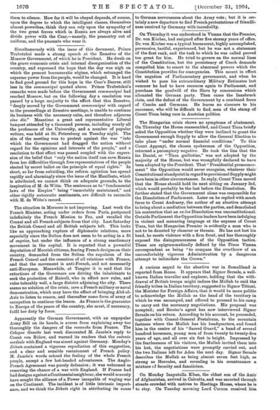Simultaneously with the issue of this document, Prince Trubetzkoi made
a strong speech at the Zemstvo of the Moscow Government, of which he is President. He dwelt on the grave economic crisis and internal disorganisation of the country, and expressed the hope that the day was nigh on which the present bureaucratic regime, which estranged the supreme power from the people, would be changed. It is hard to find good ground for this hope in the Czar's Decree, still less in the communiqué quoted above. Prince Trubetzkoi's remarks were made before the Government communique had reached Moscow, but on the following day a resolution was passed by a large majority to the effect that this Zemstvo, "deeply moved by the Government communique with regard to the proceedings at Zemstvo meetings, is unable to continue its business with the necessary calm, and therefore adjourns sine die." Meantime a great and representative Liberal banquet attended by a thousand persons, including nearly all the professors of the University, and a number of popular writers, was held at St. Petersburg on Tuesday night. The aim of the meeting was to protest against the war "into which the Government had dragged the nation without regard for the opinions and interests of the people," and a resolution to that effect was passed coupled with the expres- sion of the belief that "only the nation itself can save Russia from her difficulties through free representatives of the people elected by secret ballot on the principle of equal rights." In short, so far from subsiding, the reform agitation has spread rapidly and alarmingly since the issue of the Manifesto, which is attributed, we cannot think on adequate grounds, to the inspiration of M. de Witte. The sentences as to "fundamental laws of the Empire" being "immutably maintained," and other rigidly autocratic sentiments, are difficult to reconcile with M. de Witte's record.


































 Previous page
Previous page